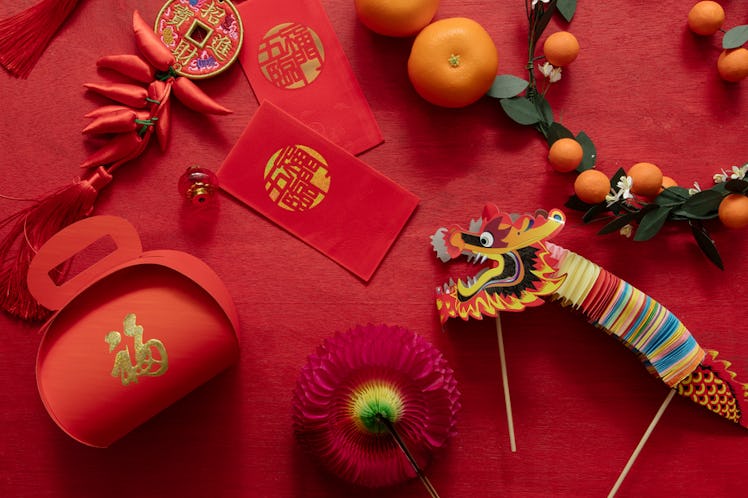
These Chinese New Year Traditions Make It Possibly The Coolest Holiday Ever
For over 4,000 years, Chinese New Year has been lighting up the world with vivid colors, mouthwatering dishes, and ancient customs that keep history alive and well. It's celebrated all over the world by people from all walks of life, with its central core reverberating from Southeast Asia. Whether you were born into a family that carefully observes every stage in this 15-day long celebration or you appreciate this shining example of cultural decadence by participating in it on your own, there are Chinese New Year traditions that you'd be deeply remiss to miss out on.
On Feb. 16, this New Year celebration descends on us all with an eruption of fireworks, the echoing sounds of ringing bells, and parades involving dancing dragons. This long and energizing holiday coincides with the Chinese lunisolar calendar, which is why it falls on a different date each year. It also signifies the passing of the torch between one animal in the Chinese zodiac and the next. In this year's case, 2017's Year of the Rooster will be replaced by Year of the Dog, which we haven't experienced since 2006.
There are countless reasons why Chinese New Year could possibly be the most exciting holiday in the history of civilization. If you're not convinced yet, these lively traditions should prove it:
Firecrackers & Fireworks
As soon as the clock strikes midnight, Chinese New Year celebrations are kicked off by a wild display of fireworks. Since fireworks actually originated in ancient China, there's no celebration that takes this explosion of fire and light more seriously. People are encouraged to continue setting off firecrackers well into the next day and even all throughout the next week. Historically, explosions were thought to ward off negative spirits. Is there a better way to start off the New Year? I can't think of one.
Festival Of Lanterns
Once the full moon arrives at the end of the 15-day long celebration, so does the Festival of Lanterns. Every city chooses to celebrate this festival with their own unique flare but the main idea is that red lanterns are lit all throughout the streets. Traditionally, people write riddles and poems on their lanterns. If someone is smart enough to solve their riddle, they get a prize. Not only is this a gorgeous festival but it also provides an opportunity to test your wits!
Dragon & Lion Dances
Colorful and glittering parades are a big feature of Chinese New Year celebrations. A main aspect of these parades are the lion and dragon dances, where acrobats and dancers all take part in breathing life into these symbolic creatures. Riding through the streets with gusto, these creatures are said to bring good luck and prosperity to all who see them.
Red Envelopes Filled With Money
If things couldn't possibly get any better, think again. Elders are expected to give children money in a beautiful red envelope. The color red is deeply entrenched with symbolism during Chinese New Year and it signifies abundance, prosperity, and good luck. No wonder people look forward to this holiday all year long!
Traditional Chinese Dishes
Celebrating family and togetherness is a major theme during Chinese New Year. What better way to do that than with food? Each day, dinners are rotated at different family member's homes. In the beginning of the celebrations, long noodles are served to signify longevity in life and by the end of the 15 days, round dumplings are eaten to symbolize a full moon. Rice, duck, fish, and pork are also served.
New Years Decorations
The streets are emblazoned with reds, golds, fire, and light during Chinese New Year. Marketplaces are swarming with enticing goods, lanterns cast their glow all over the place, and people are selling and purchasing flowers like there's no tomorrow. These flowers carry positive and healing vibrations and flowers like orchids, narcissus, and peonies are especially revered. I'm sure people look forward to Chinese New Year solely because of how beautiful their cities become.